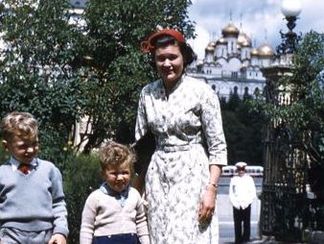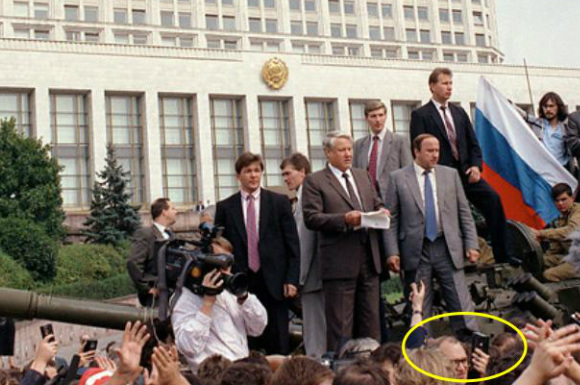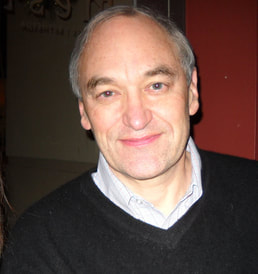ABOUT MICHAEL British embassy, Moscow, 1957
To distinguish myself from all the "presidential historians" out there, I am laying claim to a new area of expertise: "presidential crisis historian." How a president confronts the gravest challenges of modern times, and how his decisions affect the rest of us, has been a recurring theme of my seven books.
One Minute to Midnight focused on possibly the gravest crisis ever, in October 1962, when John F. Kennedy stepped back from the nuclear brink at the last possible moment. The Unwanted looked at Franklin Roosevelt's handling of the Jewish refugee crisis that preceded the Holocaust. Six Months in 1945 examined how FDR and Truman negotiated the perilous transition from World War to Cold War. My latest book, King Richard, relates the Shakespearean tale of the self-made man who scrambled his way to the top only to see his dreams turn to nightmares because of tragic character flaws. Now an American citizen, I was born in Belfast, Northern Ireland. I am a child of the Cold War--almost literally. I went to Russia for the first time at the age of six weeks, courtesy of my diplomat parents. Here I am, aged seven, with my mother and younger brother Geoffrey, in the British embassy, opposite the Kremlin, under the watchful eye of a KGB guard. Before becoming an author, I was a journalist and foreign correspondent. After a stint in Rome as a correspondent for Reuters, and a tour of Africa, I lived in Yugoslavia during the twilight years of Marshal Tito. I moved to Poland for The Washington Post just in time to witness the extraordinary spectacle of workers rebelling against the "workers' state." I was the first western reporter to visit the Lenin shipyard in Gdansk in August 1980. As The Post's bureau chief in Moscow, I was standing in front of Boris Yeltsin in August 1991 when he climbed on a tank to face down Communist hardliners. (See photograph below.) In between these two events, I covered the imposition of martial law in Poland, the Chernobyl nuclear catastrophe, Gorbachev-Reagan summits, the Tiananmen uprising in China, and the 1989 revolution in Romania. Other highlights of my journalistic career included exposing the Soviet atomic spy known as Mlad (Theodore Hall), revealing Madeleine Albright's links to the Holocaust, and covering the Bosnia peace negotiations as the diplomatic reporter for The Post. For a change of pace, I was swimming off the southern tip of Sri Lanka in December 2004 when I was almost swept away by the monster tsunami. In 2007, I launched The Post's Fact Checker column, handing out "Pinocchios" to lying politicians.
In addition to my work as a journalist and a historian, I have taught courses at the universities of Princeton, Michigan, and Georgetown, as well as American University. I also spent seven years at the United States Holocaust Memorial Museum where I organized conferences on the genocides in Rwanda and Bosnia, and researched and wrote The Unwanted. King Richard is my seventh book. Not to be confused with
the "other" Michael Dobbs |
DATELINES
Farewell to Poland 1982
Soviet "Crisis of Faith" 1982 D-Day anniversary 1984 Nicaragua and the Superpowers 1988 A visit with Havel 1988 Inside the Gulag 1989 Tanks in Lithuania 1989 Tiananmen Square 1989 Romanian orphans 1990 McDonalds in Moscow 1990 The tragedy of Vukovar, 1991 Bosnia on the Brink 1991 Goodbye USSR Dec 1991 A Russian spymaster 1992 Atomic Spy unmasked 1996 Breaking the secret code 1996 Madeleine Albright 1997 Milosevic overthrow 2000 TRAVEL WRITING
Ile St. Louis, 1984
Tour de France, 1985 In search of the Impressionists, 1986 Deauville, 1986 Wine-tasting in Burgundy, 1986 Cesky Krumlov, 1988 Literary St. Petersburg, 1994 A Venetian island 2016 ESSAYS
The Rise of Political Fact-Checking: an essay on the fact-checking revolution in American journalism.
USIP report: Why we should still study the Cuban missile crisis. "Why I write": Essay for Publishers' Weekly.
Thoughts on the collapse of communism and the fall of the Soviet Union, twenty years later. |

